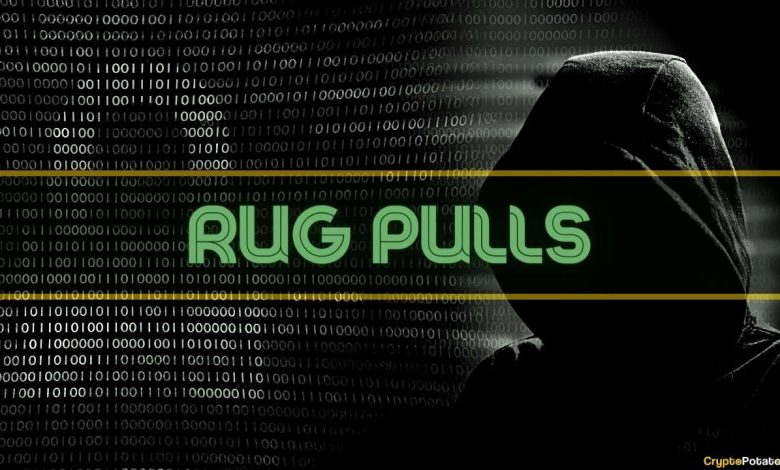How to Avoid DeFi Scams and Rug Pulls

- Understanding the risks of DeFi scams
- Identifying red flags in DeFi projects
- Tips for conducting due diligence before investing in DeFi
- Common tactics used in rug pulls and how to avoid them
- The importance of community and developer transparency in DeFi
- Steps to take if you fall victim to a DeFi scam
Understanding the risks of DeFi scams
When participating in decentralized finance (DeFi) projects, it is crucial to understand the risks associated with potential scams. DeFi scams have become increasingly prevalent in the crypto space, with malicious actors taking advantage of unsuspecting investors. It is essential to be aware of these risks and take necessary precautions to protect your investments.
One common type of DeFi scam is known as a “rug pull,” where developers abandon a project after attracting a significant amount of funds, leaving investors with worthless tokens. To avoid falling victim to rug pulls, it is important to conduct thorough research before investing in any DeFi project. Look into the team behind the project, the tokenomics, and the overall legitimacy of the project.
Another risk to be aware of is the possibility of smart contract vulnerabilities. Smart contracts are the backbone of many DeFi projects, and if they are not properly audited or secured, they can be exploited by hackers. It is crucial to only invest in projects that have undergone rigorous security audits by reputable firms.
Additionally, be cautious of projects that promise high returns with little to no risk. If an investment opportunity sounds too good to be true, it probably is. Always exercise caution and skepticism when evaluating potential DeFi projects.
By understanding the risks of DeFi scams and taking proactive measures to protect your investments, you can minimize the likelihood of falling victim to fraudulent schemes. Stay informed, do your due diligence, and only invest what you can afford to lose in the volatile world of DeFi.
Identifying red flags in DeFi projects
When engaging with DeFi projects, it is crucial to be vigilant and watch out for red flags that could indicate potential scams or rug pulls. By being aware of these warning signs, investors can protect themselves from falling victim to fraudulent schemes.
- One common red flag to look out for is anonymous teams behind DeFi projects. If the developers are not transparent about their identities, it can be difficult to hold them accountable if something goes wrong.
- Another red flag is unrealistic promises of high returns with little to no risk. If an investment opportunity sounds too good to be true, it probably is.
- Additionally, projects with poor security measures in place should raise concerns. Without proper security protocols, DeFi platforms are vulnerable to hacks and theft.
- Furthermore, a lack of audits or third-party verification can be a sign that a project is not legitimate. Reputable projects will often undergo audits by independent firms to ensure their code is secure and their practices are transparent.
- Lastly, projects with low liquidity or small trading volumes can be risky investments. Without enough liquidity, investors may struggle to buy or sell their tokens at fair prices.
By keeping an eye out for these red flags, investors can make more informed decisions when participating in DeFi projects. It is essential to conduct thorough research and due diligence before committing any funds to a project to mitigate the risk of falling victim to scams or rug pulls.
Tips for conducting due diligence before investing in DeFi
Before investing in DeFi projects, it is crucial to conduct thorough due diligence to mitigate the risk of falling victim to scams or rug pulls. Here are some tips to help you navigate the DeFi space safely:
- Research the team behind the project: Look into the backgrounds of the developers and founders to ensure they have a solid track record in the crypto space.
- Check the project’s whitepaper: Make sure the project has a detailed whitepaper that outlines its goals, technology, and roadmap.
- Review the project’s code: If you have the technical expertise, review the project’s code on platforms like GitHub to assess its quality and security.
- Look for audits: Check if the project has been audited by reputable firms to verify its security and legitimacy.
- Join the community: Engage with the project’s community on social media and forums to get a sense of the project’s reputation and community sentiment.
By following these tips and conducting thorough due diligence, you can make more informed investment decisions in the DeFi space and reduce the risk of falling victim to scams or rug pulls.
Common tactics used in rug pulls and how to avoid them
There are several common tactics that scammers use in rug pulls to deceive investors and steal their funds. By being aware of these tactics, you can protect yourself from falling victim to DeFi scams.
- Anonymous Teams: One of the red flags to watch out for is projects with anonymous teams. If the developers behind a project are not willing to reveal their identities, it is a major warning sign that they may be planning a rug pull.
- Unaudited Smart Contracts: Another tactic scammers use is deploying unaudited smart contracts. These contracts may contain vulnerabilities that can be exploited to drain funds from the project.
- Overpromising Returns: Scammers often lure investors in by overpromising returns that are too good to be true. If an investment opportunity sounds too good to be true, it probably is.
- Lack of Transparency: Projects that lack transparency in their operations and financials should be approached with caution. Make sure to do thorough research before investing in any project.
- Sudden Liquidity Pulls: One of the most common tactics used in rug pulls is a sudden liquidity pull. Scammers will drain the liquidity pool, leaving investors with worthless tokens.
By being vigilant and doing your due diligence, you can avoid falling victim to rug pulls and other DeFi scams. Remember to always research projects thoroughly, verify the identities of the team members, and never invest more than you can afford to lose.
The importance of community and developer transparency in DeFi
Community and developer transparency are crucial aspects in the world of DeFi to prevent scams and rug pulls. When a DeFi project lacks transparency, it becomes challenging for users to assess the legitimacy and security of the platform. By fostering an open and honest relationship with the community, developers can build trust and credibility, which are essential for the success of any DeFi project.
Transparency in DeFi involves providing clear and detailed information about the project, including the team behind it, the project’s goals and objectives, the tokenomics, and the smart contract code. Community members should have access to this information to make informed decisions about participating in the project. Additionally, developers should be open to answering questions and addressing concerns raised by the community to ensure transparency.
When developers are transparent about their project, it helps to establish a sense of accountability and responsibility. This transparency can act as a deterrent for potential scammers who thrive on anonymity and lack of accountability. By being open about their intentions and actions, developers can demonstrate their commitment to building a legitimate and trustworthy DeFi project.
Steps to take if you fall victim to a DeFi scam
If you find yourself in the unfortunate situation of falling victim to a DeFi scam, it is crucial to take immediate action to mitigate any further losses. Here are some steps you can take if you have been scammed in the decentralized finance space:
1. **Stop any further transactions**: As soon as you realize you have been scammed, it is essential to stop any further transactions or interactions with the fraudulent project. This will help prevent additional funds from being siphoned off.
2. **Gather evidence**: Collect all relevant information related to the scam, including transaction details, communication with the scammers, and any other evidence that may be useful in reporting the incident.
3. **Report the scam**: Contact the appropriate authorities, such as the platform where the scam took place, regulatory bodies, or law enforcement agencies. Reporting the scam can help prevent others from falling victim to the same scheme.
4. **Seek legal advice**: If you have suffered significant financial losses due to the scam, consider seeking legal advice to explore your options for recourse. A legal professional can help you understand your rights and take appropriate action.
5. **Educate others**: Share your experience with the community to raise awareness about the scam and help others avoid falling victim to similar schemes in the future. By educating others, you can contribute to a safer DeFi ecosystem for all participants.
By taking these steps, you can protect yourself and help prevent others from falling prey to DeFi scams. Remember to stay vigilant and conduct thorough research before participating in any decentralized finance projects to minimize the risk of being scammed.




